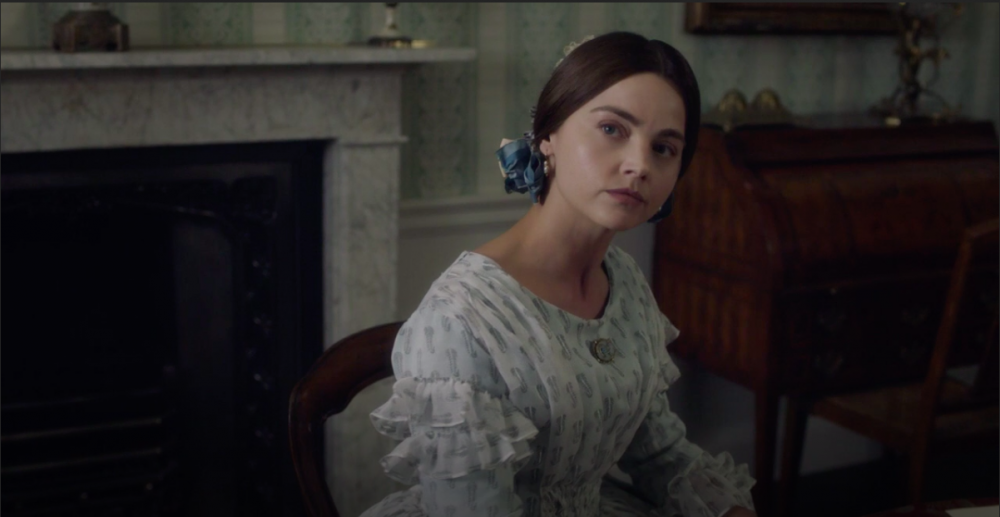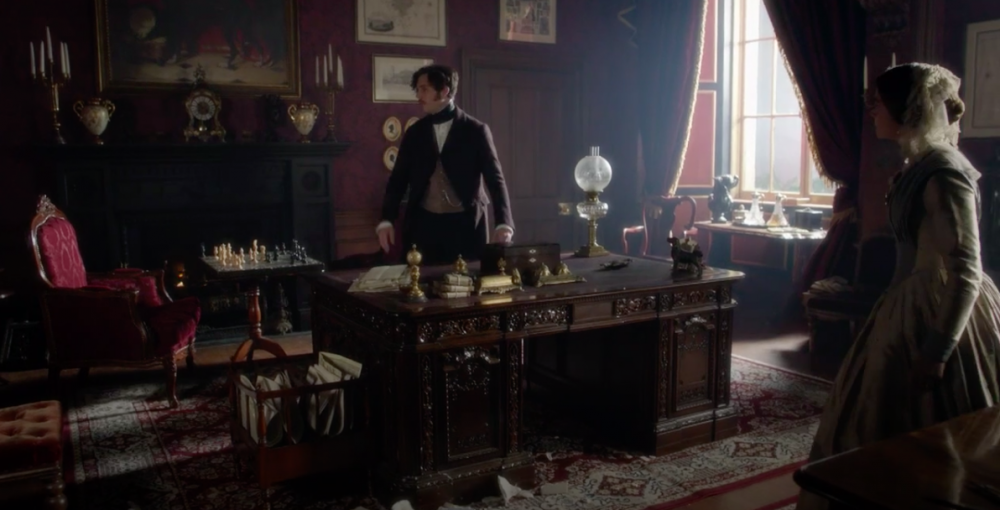
I Am Angry Victoria: A Season 3 Review
Ask a Victoria on Masterpiece PBS fan what they didn’t like about Season 3 and they’ll likely say something about missing the romance between Queen Victoria (Jenna Coleman) and Prince Albert (Tom Hughes). I believe showrunner Daisy Goodwin made the correct decision this season to season to test the limits of their relationship. More importantly, Victoria’s arc this season speaks to me in a deeply personal way I didn’t expect at first but I have grown to love.

I’ve never experienced marriage or postpartum depression, but I know full well Victoria’s battle against expected behavioral norms. I was diagnosed with having Autism Spectrum Disorder in the 7th Grade after years of abuse from kids who never understood the way my mind works. ASD patients are at a higher risk for depressive disorders. Just as Albert scolds Victoria for being “irrational”, I’ve had relatives and even friends call me “nonsensical” for coming to a conclusion about a situation using unconventional methods. Watching Coleman channel the fury and rage of a woman who keeps being held back by patriarchal and monarchical restraint resonated with me in a most powerful way. Obviously, I will never be a politician, but the sexism and ableism (anti-disability discrimination) women have to face today remains quite similar.
Sadly, I am an only child, but I’ve had several people like Feodora (Kate Fleetwood) in different points of my life. Fake friends who only wanted me around because they wanted things like free tutoring or fandom connections. Some started out as genuine but then became offended at the way I reacted to a stressful social situation. Others were gaslighting masters, and I rebelled at their horrible treatment of me. Victoria’s frustration over Feodora’s emotional tricks hit me where it hurt. Her lashing out was incredibly relatable. Outbursts due to social stresses, anger or overstimulation of the senses are a common ASD symptom. Those who interpreted what Victoria did as purposeful domestic violence missed the point in regards to the state of her mental health.
Feodora’s character arc is frequently criticized for perpetuating negative stereotypes about female friendships. None of these critics acknowledge how effortlessly Fleetwood pulls off Feodora’s bitterness and manipulation. Since the beginning of the show, the Kensington System was setup to keep Victoria not only sheltered but also easily manipulated. It makes sense that someone else from the Kensington System would want to drive a wedge between the royal couple. In a show where a single woman is above literally everyone else, it is extremely difficult for Victoria to have anything other than unequal friendships. Behind what people may call pejoratively a soap opera, I see a great of example of how the world takes advantage of those who are autistic or have other neurological differences and force them to conform to invented standards of “normality”.

Albert usually understands Victoria’s mindset. However, this season he was especially lenient towards Feodora’s gaslighting. Victoria becomes increasingly angry that Albert insists that she is irrational is exactly what gaslighters do to their victims. Every time Albert questioned Victoria’s point of view, I flashed back in my mind to the times when I expected friends of mine to believe my side of a story. Victoria smashing the phrenology head reminded me of the times I’ve torn up papers in the middle of an argument.
People like Feodora turn sympathetic friends and family into antagonists through lies and other tactics. Fans who believe this was simply “bad writing” clearly do not understand what it means to be in this situation. These critques also fail to understand that the same social attitudes that called Victoria “irrational” are the same ones that resulted in Sophie, the Duchess of Monmouth diagnosis of insanity. Albert redeems himself by the end of the season by not only apologizing fully but also taking steps to support her decisions.
In terms of the complaints about historical inaccuracies surrounding Season 3, I am far more concerned that only one episode touched upon Lord Palmerston (Laurence Fox) and Victoria’s role in expanding imperialism and colonialism in this era than Feodora’s plot. Although Fox played a great cad-with-a-conscience, exploring the darker side of Palmerston’s populism would have been fascinating for the audience. Personal relationships and historical ambiguity were always a highlight of Victoria’s scripts. The show never intended to be a purely biographical show, and fans should know this very well.

Vicbert as fans calls the Victoria/Albert relationship remains the heart of Victoria. The Season 3 promotional posters show Jenna Coleman and Tom Hughes standing further apart from each other compared to earlier promos. It was clear from the beginning of this season that hard times were ahead. Fan disappointment likely stems from who expecting the same romance with only minor bumps in the road as Season 2. Good screenwriting of an on-screen romance depends on character development, and Vicbert needed to face hard times to make their relationship relatable and realistic to viewers. In case people want to accuse me of being completely anti-Vicbert, I praised the show in Season 2 for the development of the relationship.
1848-1851 was an especially turbulent time in British and European politics, so it is impossible to argue that they didn’t have massive fights about policy and other issues. Courtiers documented the drink throwing incident. Queen Victoria’s diaries likely contained rants about Albert but we will never know. A season consisting only of romance and royal nursery scenes would get tiresome extremely quickly. Albert’s collapse at the last scene of the season proves just how much effort he devoted to the Great Exhibition and other matters at the expense of his family and personal well-being.

Season 3’s shakeup of beloved characters proved the series could hit more than one note, which is key in an era of tough competition in royal-centric series. Victoria has been written off by many critics outside of the fandom as an inferior series for stressing romance and personal relationships over other plot elements. This season proves those critics wrong in many ways. The cast of Victoria is more thanapable of portraying tragedy and high stakes political drama. The staging, costuming, and cinematography remain top-notch, and in the case of recreating the Georgian Ball and Great Exhibition outdid previous seasons. Mammoth Screen continues to establish its reputation as a company known for excellent period dramas.
The only downside to the shakeup is the death of Nancy Francatelli and the departure of Charles Francatelli from the palace did undermine the audience’s sympathy for the servant characters. Victoria set itself apart from the crowd by featuring the downstairs which made the upstairs characters look good. In addition, the Skeretelli romance resulted in Nell Hudson and Ferdinand Kingsley developing their own following in the fandom. The end of their storyline likely resulted in some fans losing interest in the rest of the season. The Duchess of Monmouth and Joseph storyline shifts the focus from the servant-master dynamic to the ongoing thread about the patriarchal expectations at the time. Abigail Turner by the end of the season is more of Victoria’s eye on the figurative Victorian streets than an audience point of view character.
I am fairly sure Daisy Goodwin did not intend to create this parallel between Victoria’s behavior and my own diagnosis on purpose, but I am eternally grateful to have a character in a period drama that I can relate to on this level. I look forward to Season 4 and a successful UK airing of Season 3.












I feel like there was a parallel between Victoria and Sophie as well — one husband was overtly brutal and one was covert, but both men decided the same about their wives, that they were being irrational and needed reining-in. I have never really liked Albert, but he was especially unreasonable in this season.
Feo reminded me of someone whose situation has always been unstable and so she will exploit whoever can give her the most stability. Emphasis on exploit. Perhaps she didn’t act out of malice, but she knew that she had to put Victoria down in order to get hers. She can’t help it anymore. It’s her modus vivendi.
Albert covertly brutal?? What??? So is Victoria just an idiot for being madly in love such a “brutal” man? I also question why you would you admire Victoria, as she clearly supports and is madly in love with this “brutal” man? I think your dislike of the Albert character has colored your view of him (you WANT to see him as a monster because you don’t like him) and has prevented you from seeing how BOTH Victoria and Albert have their faults, faults that were exploited by Lord Palmerston and Feodora to turn Victoria and Albert against each other. Luckily, they BOTH came to their senses in the end.